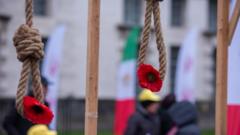**The UN's warnings highlight a troubling trend in Iran's use of the death penalty as it reports 901 executions for the year 2024, a steep increase from the previous year.**
**Iran's Execution Rates Surge: UN Reports Record 901 Executions in 2024**

**Iran's Execution Rates Surge: UN Reports Record 901 Executions in 2024**
**Escalation in Capital Punishment Raises Alarms Among Human Rights Advocates**
In a shocking revelation, the United Nations has reported that Iran executed at least 901 individuals in 2024, the highest figure in nine years and a 6% rise from the 853 executions documented in 2023. This surge, which includes around 40 executions just in the last week of December, has drawn significant concern from human rights advocates and the UN’s human rights chief, Volker Türk.
"It is deeply troubling that we continue to witness an increase in the number of executions in Iran year-on-year," Türk stated, urging Iranian authorities to implement a moratorium on capital punishment, with a view toward abolishing it entirely. His comments underscore the fundamental human rights violations presented by state-sanctioned executions, particularly for acts that should be protected under international law.
The highest percentage of executions pertained to drug-related offenses, but a worrying trend was also observed with the execution of political dissidents and individuals connected to the widespread protests of 2022. The UN indicated a notable increase in the execution of women, with at least 31 women executed, the highest recorded since monitoring began 17 years ago. Reports showcased deeply troubling cases, such as that of Leila Ghaemi, executed for killing her husband after he raped their daughter, and Parvin Mousavi, who was put to death after being misled into transporting drugs.
Furthermore, a report by the Kurdish human rights group Hengaw revealed that over half of those executed belonged to ethnic minorities, including 183 Kurds, indicating a perceived focus on specific communities within Iran's punitive measures. The UN's fact-finding mission underscored that ethnic and religious minorities have faced intensified repression since the “Woman, Life, Freedom” protests ignited, which were spurred by the death of a Kurdish woman in police custody.
Alarmingly, Human Rights Activists News Agency (HRANA) documented the execution of five juvenile offenders, a clear breach of international standards prohibiting capital punishment for those under the age of 18 at the time of their alleged crime. Iran's actions are starkly illustrated by Amnesty International's findings, suggesting that the nation accounted for a staggering 74% of the world's known executions in 2023, not including classified figures from China.
As the international community keeps a close watch, the situation in Iran appears to be a stark reminder of the ongoing struggle against capital punishment and human rights abuses. Activists call for urgent measures, urging Iran to reconsider its reliance on this extreme form of punishment and the growing climate of fear it instills among its populace.
"It is deeply troubling that we continue to witness an increase in the number of executions in Iran year-on-year," Türk stated, urging Iranian authorities to implement a moratorium on capital punishment, with a view toward abolishing it entirely. His comments underscore the fundamental human rights violations presented by state-sanctioned executions, particularly for acts that should be protected under international law.
The highest percentage of executions pertained to drug-related offenses, but a worrying trend was also observed with the execution of political dissidents and individuals connected to the widespread protests of 2022. The UN indicated a notable increase in the execution of women, with at least 31 women executed, the highest recorded since monitoring began 17 years ago. Reports showcased deeply troubling cases, such as that of Leila Ghaemi, executed for killing her husband after he raped their daughter, and Parvin Mousavi, who was put to death after being misled into transporting drugs.
Furthermore, a report by the Kurdish human rights group Hengaw revealed that over half of those executed belonged to ethnic minorities, including 183 Kurds, indicating a perceived focus on specific communities within Iran's punitive measures. The UN's fact-finding mission underscored that ethnic and religious minorities have faced intensified repression since the “Woman, Life, Freedom” protests ignited, which were spurred by the death of a Kurdish woman in police custody.
Alarmingly, Human Rights Activists News Agency (HRANA) documented the execution of five juvenile offenders, a clear breach of international standards prohibiting capital punishment for those under the age of 18 at the time of their alleged crime. Iran's actions are starkly illustrated by Amnesty International's findings, suggesting that the nation accounted for a staggering 74% of the world's known executions in 2023, not including classified figures from China.
As the international community keeps a close watch, the situation in Iran appears to be a stark reminder of the ongoing struggle against capital punishment and human rights abuses. Activists call for urgent measures, urging Iran to reconsider its reliance on this extreme form of punishment and the growing climate of fear it instills among its populace.






















